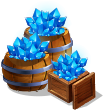Vol.5, Ch.5, P.9
Anear the southern spurs of the holy mountain, at the Reùlingen encampments. There they lingered: braves embattled and broken. On the mountain had they marched; with the 2nd had they vied; and at the last, a grievous blow had they been dealt. With further battle made futile, they had then scattered down the slopes, frantic in their defeat, yielding all the steps and all the ground so bought with blade and blood—till upon Déu Tsellin proper they were no longer.
And so did they sit in sombre and silence; their thousands once so thunderous, now reduced to a dithering throng. Some pondered how large the camp now seemed. How empty. And how quiet. Indeed, it was a lamentable moment for them all, to say the very least. But most lamentable was one corner of the camp, whereupon was sat a certain woman, stooped upon a stool, staring down at the stones at her feet. Young she was, and yet wilted by what seemed all the sorrows of the world.
“Fräulein…”
And standing there beside her was Guido. Wounded of body and bosom, too, was this brave. For it had been a harrowing and hard-fought battle, from which he would bear many a scar and remember many a missed companion.
Still, he understood one thing well: that amongst all those so remaining, the most wounded of them all was none other than Erika herself.
Oh, Walter. He who for so long had lived alongside her. He who had ever toddled timidly in her confident tow. He who had grown, and strengthened, and wisened rightwisely to one day cast his lot into the cauldron of war.
Only to lose his life in saving hers.
So asudden had it happened. Walter, pushing Erika away, had taken all of Stefan’s attack for himself. A fool’s feat, one might measure this. Walter was a hero, after all, upon whose shoulders all the Reùlingen brunt had been borne. If any life were to be lost, his ought have been the very last. But, mind, the hero himself was no fool. For in that moment, he had realised a heartwrenching truth: that as things were, Erika was sure to share in his doom.
Thus had he flung his friend away, that she alone might live on. The price, of course, was certain defeat. But better a certain defeat than a certain death. Such had been Walter’s chilling judgement, his stern resolve, to which Guido was now grimly enlightened.
“…”
The brave quietly clenched his fists. Ever the proud, impenetrable warrior, Guido was never one to buckle and bewail the woes of war. Oh, to be sure. And yet, in that moment, he could not omit the agony grinding down upon his own heart. For Walter had been a dear friend. Gunthar, too, long a bosom brother to him, was now for ever lost.
Still, the curtains of this cruel day were yet to close. Hence, heartbroken though he was, Guido deemed it his duty to speak up.
“…Come, Fräulein,” he pressed his superior softly. “Our road is long yet. There is much to think… and much to do.”
Like Lise of Víly, Erika herself was a commander, despite her now-defunct office as Walter’s sword. Indeed, being a jarl-daughter and decorated brave both, hers was a rank high amongst these remnant Reùlingen. Thus did it fall to her to decide whither their defeated feet must now walk.
“…”
And yet, the young woman made no answer, nor any movement of her mourning self, for that matter. It was a sight utterly sundering to Guido. Though a brave oft brusque and as stern as stone, he knew how cut up Erika was; for to her, Walter had been a person special in the utmost.
Be that as it may, Guido desired little to dwell upon death, but to consider instead the memory of the dead themselves. For by all means must they be honoured—by all means must their sacrifices be requited.
“…Gunthar gave his life for Walter, as Walter did thence for you,” Guido said to Erika, kneeling now at her side. “The torch is passed, Fräulein. With it, you may yet lead us who are lost, and let leave this plane in peace our too-dear fallen.”
Walter had died for Erika. That was the untarnished truth. To air it afore a fraught and fracted Erika was, therefore, a cruel conduct. But mercy and cruelty are seldom the concerns of necessity.
“…”
The jarl-daughter herself, however, remained remote. Her hair was broken of its braids, that it curtained now both her downcast countenance and what expression it might have worn. Perhaps she was aflood with thoughts of Walter. With feelings. With memories. Or perhaps she was empty; wholly and numbly hollow, being too bereaved for the mere effort of thought. And seeing her so inconsolate, Guido was at a loss for further words.
‘…Sċeaþatán…!’
But in that silence, in Guido’s ears, there yet rang that last roar of Walter’s. And then he recalled it. Clear as day: the final exchange between his fallen friend and their knightly foe Stefan.
In a flash, the mareschal had run the Reùlingen hero through. Silver eviscerated vitals. Blood spilt, deep and bright. But Walter himself had neither cowed nor wailed at the wound. No—he had answered, blasting Stefan with a spell of livid levin. It is certain; till his very last breath had the hero-wiċċa challenged this most fearsome of foes.
But ever as he recalled this, Guido found himself filled more with frustration than pride. As it happened, Walter’s magick had not, in fact, unmade Stefan; for in laxing his grip and abandoning his blade, the mareschal had been able to avert his own doom. Indeed, even after waging so fraught a battle, he had stamina enough to make such an escape as to put the speediest falcons to shame.
Yet it was not only his faculties that had allowed Stefan a longer life. Hæleþmund, Walter’s penultimate magick, had been invoked at cost of casting away the staff. And so it was that, bereft of a medium of focus, Walter’s Sċeaþatán had discharged without directionality. Oh, verily: vehement though the levin was, at the last had it landed but grazes upon Stefan’s flesh. The rest was history: the swordless mareschal shirked the fray and, though only shallow of wound, ultimately put the southern battlefield behind him, loathful, perhaps, of further risk and rigour. A wise decision; after all, with Walter undone, the rest of the Reùlingen was sure to shatter. And shatter they had, for in moments’ time, all the Reùlingen host had resigned themselves to a swift, if not miserable retreat afore an inspirited 2nd.
What rue Guido had known then. Rue and humiliation. For unto the very end had the fates smiled instead upon Stefan. But in that despair, there had remained one small solace: in quitting combat, the mareschal had vouchsafed unto Guido time enough to collect an unconscious Erika and flee the frontlines. The brave had even a second or three to confirm the death of Walter, whose body lay limp and red upon the slope—a sight now seared deep into Guido’s soul.
“…”
The brave sighed without sound. What was next to come became clear to him: after quick care and convalescence, Stefan would return to the fray, fresh and re-armed. Walter’s final offence, therefore, had been ventured in vain. But knowing him well, Guido could not imagine the hero’s departed spirit grudging the outcome; for at the last, Walter had been resolved to do naught else but deliver his dear Erika from impending death. And that was precisely what he had accomplished.
Now, however, was it Erika’s turn to awaken to her own resolve; to forge ahead and do what must needs be done.
“Come, Fräulein,” Guido urged her. “Let us bear this—together.”
“Your pardon…”
But at that moment: a new voice. Gathered now afore the two was a scant assembly of Staffelhäupter. It seemed they, too, were of Guido’s mind, having come to seek their next orders.
“The eastern fray is yet afire,” one of them reported. “…What might we do?”
Guido stood and paused in thought. “The Cutcrowns?” he wondered aloud as he looked to the north-east. And at length, he said trailingly, “The fair winds have fled us here. But, if over there, then mayhaps…”
This encampment of the Reùlingen; being erected anear the toes of the mountain, it was in receipt of tidings that ran at all times between the three camps. And from what the Staffelhäupter next relayed to Guido, it was apparent that the Víly-Gorka alliance had won through at the northern slopes and were soon to summit the mountain; whilst for their part, the Cutcrowns were currently in bitter contention with the knights of the 1st.
Guido peered intently at the ridges yonder north-east. Those shoulders of Déu Tsellin isolated the three-front forces, that is certain. But betwixt the Reùlingen and the Cutcrowns’ positions, proximate to the base of the mountain, there sat a slump in the slopes where the earth had failed long ago—a passage, therefore, connecting the two great combes.
He then glanced at Erika. Despondent though she was, surely the jarl-daughter, too, must have realised the same.
That it was possible to come to the Cutcrowns’ rescue.
That this battle of theirs could yet be fought.
───────── ∵ ─────────











Comment (0)